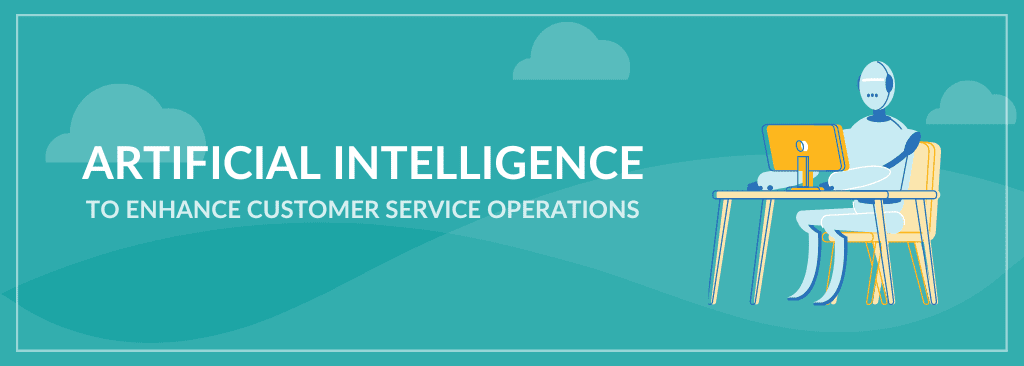Harnessing Artificial Intelligence to Enhance Customer Service Operations
There is a deluge of articles and posts about the impact of artificial intelligence (AI) in the business world. More so in the customer service space.
Some of the predictions include:
- AI would take away all the customer service jobs.
- AI will lead to a 20% to 30% reduction in customer service and support agents.
- AI will create new customer service jobs.
While early AI adoption studies highlighted automation potential in low-skill, repetitive jobs, the emergence of Generative Pre-trained Transformers (GPTs) reinforces a shift toward non-routine tasks.
When it comes to customer service, AI can deeply influence several jobs and potentially replace some of them.
What Are the Customer Service Jobs That Will Be Influenced by AI?
Here are some examples:
Tier 1 Support
Tier 1 support representatives handle basic and repetitive customer inquiries, such as password resets, account information, and FAQs.
AI can be trained on historical customer interactions to generate accurate and contextually appropriate responses.
For instance, if a customer asks about the account balance, the AI can provide the relevant information based on the user’s query and historical data.
If a customer asks about order status, the AI could generate a response with accurate and up-to-date information.
AI could analyze the incoming messages and categorize them based on urgency or topic, ensuring that high-priority issues are escalated to human agents. At the same time, routine inquiries are handled by the AI itself.
Live Chat Operators
Many organizations employ live chat operators to assist customers in real time on their websites.
AI-powered chatbots can engage in these conversations by understanding customer queries and providing instance responses.
For instance, if a customer asks about product specifications, the AI can provide detailed information without human intervention.
Virtual Assistants
AI can replace or enhance virtual assistants that handle tasks like appointment scheduling, booking reservations, and answering common queries.
For instance, a hotel might have an AI virtual assistant that helps customers book rooms based on their preferences and availability.
Automated Phone Interactions
AI can be used to automate phone-based customer service interactions.
Instead of navigating through IVR menus, customers can directly interact with AI that understands their spoken or typed queries and responds accordingly.
For example, an airline could employ an AI system to assist customers in rebooking flights due to cancellations.
AI could transcribe phone conversations and generate summaries, helping agents quickly review the details of previous interactions before speaking with a customer again.
For common queries, the AI could assist agents by suggesting scripted responses or providing relevant information, improving the consistency and accuracy of responses during calls.
FAQ Updates and Maintenance
What do you do with common and repetitive queries in a traditional customer service function?
You add them to the frequently asked questions section, which is easily accessible for all the agents.
Often, we make FAQs available for the customers to go through them directly and self-service their needs.
Organizations constantly keep updating their FAQs based on the queries they receive from their customers.
AI can help keep these FAQs up-to-date by automatically generating responses based on new queries and information. This reduces the need for manual updates and maintenance.
Language Translation Services
In businesses that deal with global customers, AI can play a role in translating customer inquiries and responses in real time, enabling seamless communication across language barriers.
Product Recommendations
Why is Amazon so famous as an eCommerce platform?
It is because of its ability to recommend products that are relevant to you.
Their product recommendation engine uses AI that considers your browsing history, preferences, and what people similar to your demography have bought.
Besides, a significant portion of Amazon’s revenues are attributed to the product recommendations they give.
AI can help you provide personalized product recommendations. Instead of relying solely on manual curation, AI can analyze vast amounts of data to suggest relevant products.
Technical Troubleshooting
AI can assist customers in diagnosing and troubleshooting technical issues with products or services.
By asking questions about the problem and symptoms, the AI can narrow down potential solutions or escalate complex issues to human specialists.
In my mind, AI would improve the job quality of customer service representatives as opposed to replacing them.
Besides, AI can create newer jobs that weren’t thought of earlier.
As a customer service function, you should start embracing AI, making the lives of your employees and customers easier.
While AI can help improve customer service efficiency and consistency, we must be mindful of its limitations. The AI might struggle to understand nuanced emotions, complex inquiries, or situations requiring empathy and human judgment.
Therefore, a hybrid approach that combines the strengths of AI with human expertise is likely to yield the best results in customer service operations.
